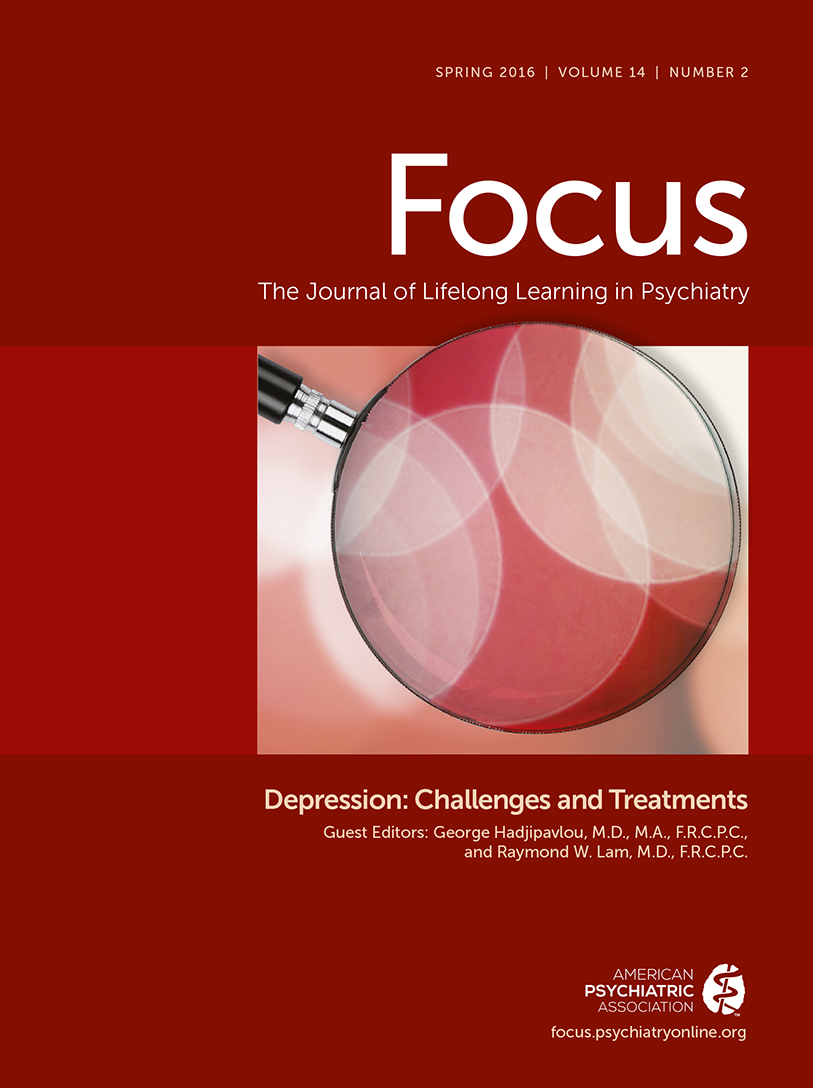Abstracts: Depression: Challenges and Treatments
Post-Stroke Depression: A Review
Am J Psychiatry 2016; 173:221–231
Poststroke depression (PSD) has been recognized by psychiatrists for more than 100 years, but controlled systematic studies did not begin until the 1970s. Meta-analyses addressing almost all major clinical issues in the field have emerged because of the relatively small number of patients included in some stroke studies. In order to build large databases, these meta-analyses have merged patients with rigorously assessed mood disorders with major depressive features with patients scoring above arbitrary cutoff points on depression rating scales, thus missing important findings such as cognitive impairment associated with major but not minor depression. Nevertheless, PSD occurs in a significant number of patients and constitutes an important complication of stroke, leading to greater disability as well as increased mortality. The most clinically important advances, however, have been in the treatment and prevention of PSD. Recent meta-analyses of randomized controlled trials for the treatment of PSD have demonstrated the efficacy of antidepressants. Similarly, randomized controlled trials for prevention of PSD have shown that antidepressants significantly decrease the incidence of PSD compared with placebo. Early antidepressant treatment of PSD appears to enhance both physical and cognitive recovery from stroke and might increase survival up to 10 years following stroke. There has also been progress in understanding the pathophysiology of PSD. Inflammatory processes might be associated with the onset of at least some depressive symptoms. In addition, genetic and epigenetic variations, white matter disease, cerebrovascular deregulation, altered neuroplasticity, and changes in glutamate neurotransmission might be relevant etiological factors. Further elucidation of the mechanism of PSD may ultimately lead to specific targeted treatments.
Reprinted with permission from American Psychiatric Association Publishing.
Dose-Dependent Changes in Cognitive Function With Exercise Augmentation for Major Depression: Results From the TREAD Study
Eur Neuropsychopharmacol 2015; 25:248–256
Cognitive dysfunction has been repeatedly observed in major depressive disorder (MDD), particularly in areas of attention, verbal and nonverbal learning and memory, and executive functioning. Exercise has been shown to improve cognitive outcomes in other populations, including age-associated cognitive decline, but has not to our knowledge been investigated as an augmentation strategy in depression. This study evaluated the effectiveness of exercise augmentation on cognitive performance in persons with MDD and residual symptoms that included cognitive complaints following initial treatment with a selective serotonin reuptake inhibitor (SSRI). Participants enrolled in the Treatment with Exercise Augmentation for Depression (TREAD) study were randomized to receive either a low or high dose exercise regimen. TREAD participants who provided informed consent for the current study completed Cambridge Neuropsychological Test Automated Battery measures assessing Attention, Visual Memory, Executive Function/Set-shifting and Working Memory, and Executive Function/Spatial Planning domains. Data were analyzed for 39 participants completing both baseline and Week 12 cognitive testing. Overall tests indicated a significant task×group×time interaction for the Executive Function/Set-shifting and Working Memory domain. Post hoc tests indicated improvements in high dose exercisers' spatial working memory, but decreases in spatial working memory and set-shifting outcomes in low dose exercisers. Both groups improved on measures of psychomotor speed, attention, visual memory and spatial planning. This study suggests a dose-response effect of exercise in specific executive function and working memory tasks among depressed persons with a partial response to SSRI and cognitive complaints, with some cognitive functions improving regardless of exercise dose.
Reprinted with permission from Elsevier.
The Combination of Psychotherapy and Pharmacotherapy in the Treatment of Adult Depression: A Comprehensive Meta-Analysis
Journal of Evidence-Based Psychotherapies 2015; 15:147–168
No meta-analysis in the field of depression has examined the effects of combined treatment compared with pill placebo, nor has any meta-analysis integrated the comparison of combined treatment against pharmacotherapy alone and psychotherapy alone (i.e. mono treatments). In this comprehensive meta-analysis, we found that combined treatment had a moderate effect on depression compared with pill placebo (g=0.46), and small to moderate effects compared against pharmacotherapy (g=0.38) alone, psychotherapy (g=0.34) alone, and psychotherapy plus placebo (g=0.23). There were some indications for publication bias when combined therapy was compared against placebo (adjusted effect size g=0.31). In multivariate metaregression analyses we found no significant differential predictors for the four comparisons. There were some indications that the use of interpersonal psychotherapy in the combined treatment was associated with a smaller effect size, but this has to be considered with caution, because of the correlational nature of this association. Despite limitations (small number of studies; suboptimal quality of studies) this meta-analysis suggests that combined treatment of depression may be the best treatment available for adult depression, and that it is significantly more effective than placebo, pharmacotherapy alone, psychotherapy alone and the combination of psychotherapy and placebo.
Online Interventions for Depression and Anxiety—A Systematic Review
Health Psychol Behav Med 2014; 2:841–881
Background: Access to mental health care is limited. Internet-based interventions (IBIs) may help bridge that gap by improving access especially for those who are unable to receive expert care. Aim: This review explores current research on the effectiveness of IBIs for depression and anxiety. Results: For depression, therapist-guided cognitive behavioral therapy (CBT) had larger effect sizes consistently across studies, ranging from 0.6 to 1.9; while stand-alone CBT (without therapist guidance) had a more modest effect size of 0.3–0.7. Even other interventions for depression (non-CBT/nonrandomized controlled trial (RCT)) showed modestly high effect sizes (0.2–1.7). For anxiety disorders, studies showed robust effect sizes for therapist-assisted interventions with effect sizes of 0.7–1.7 (efficacy similar to face-to-face CBT) and stand-alone CBT studies also showed large effect sizes (0.6–1.7). Non-CBT/Non-RCT studies (only 3) also showed significant reduction in anxiety scores at the end of the interventions. Conclusion: IBIs for anxiety and depression appear to be effective in reducing symptomatology for both depression and anxiety, which were enhanced by the guidance of a therapist. Further research is needed to identify various predictive factors and the extent to which stand-alone Internet therapies may be effective in the future as well as effects for different patient populations.



